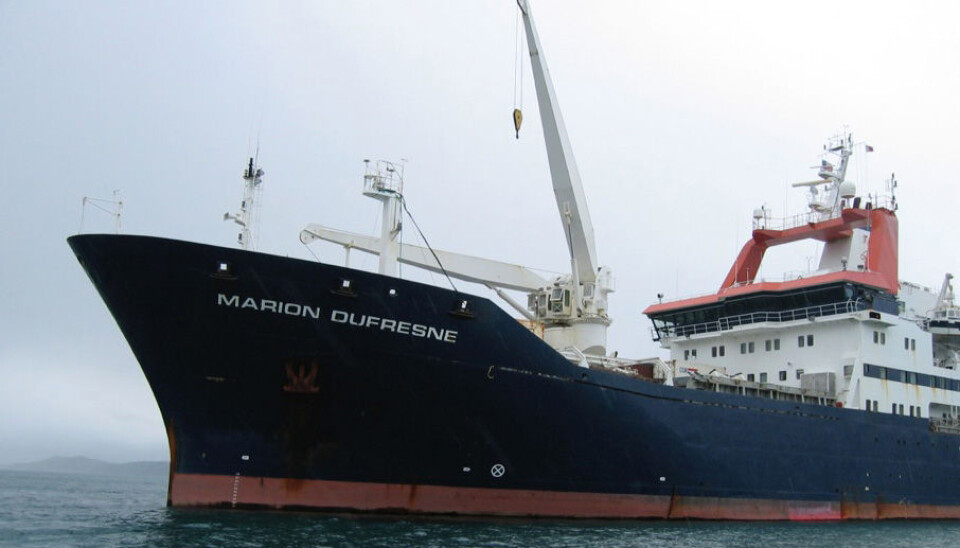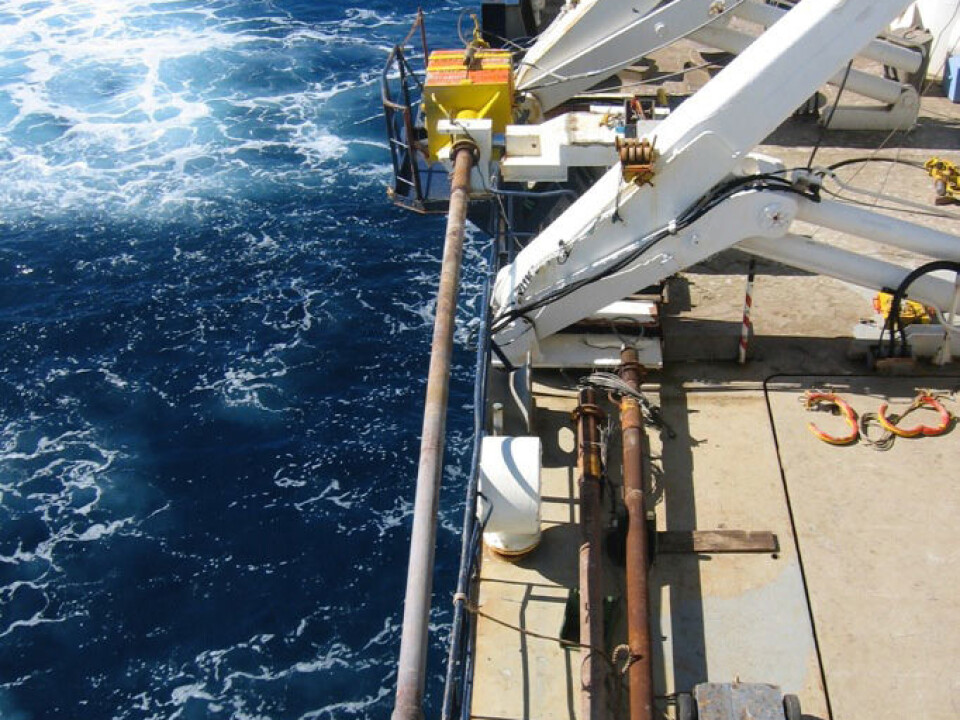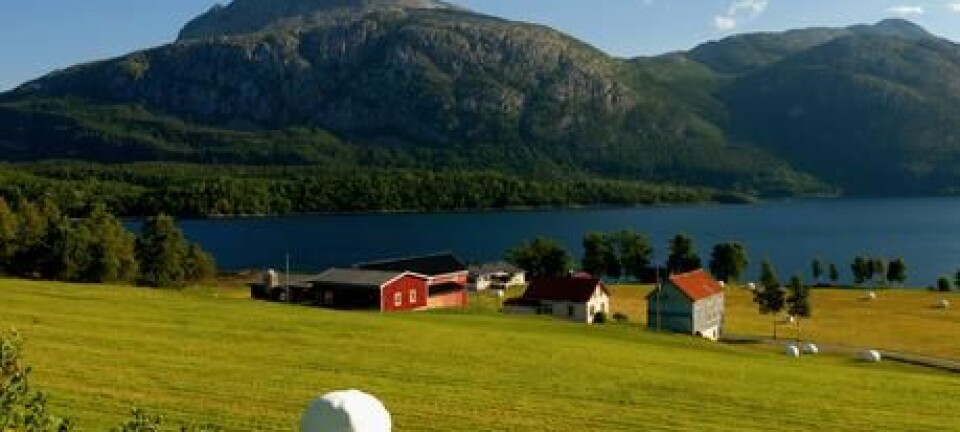
Unstable Atlantic can accelerate climate change
A warmer planet can destabilise an important oceanographic process in the North Atlantic called deep water formation. If deep water formation is affected, it will have a profound impact on global climate and precipitation.
Denne artikkelen er over ti år gammel og kan inneholde utdatert informasjon.
A team of scientists now report findings that show the deep, cold and saltier waters at the bottom of the North Atlantic are less stable – in a more fragile system – than believed by many scientists, including those on the UN’s Intergovernmental Panel on Climate Change (IPCC).
Consequently, the scientists, led by Eirik Vinje Galaasen from the University of Bergen's Bjerknes Centre for Climate Research, warn that as global temperatures climb ever higher, we might need to expect more sudden changes in climate, rather than slow and gradual changes.
This shift in climate patterns could also result in more rainfall in some regions and more droughts in others.
Deep water formation
The Gulf Stream and its northern extention, the North Atlantic Current, carry warm salty water to high latitudes in the North Atlantic, where it cools. Its high salt content, combined with the fact that cold water is denser than warm water, causes this water to sink to the depths of the Norwegian Sea.

This is known as deep water formation. Deep water that is formed in the North Atlantic fills about half of the deep ocean globally. The process affects the climate around the Atlantic Ocean and sequesters much of the excess industrially produced atmospheric carbon dioxide, which has helped to moderate the effects of global warming.
It happened in the past
In this week’s edition of the magazine Science the research team shows that the circulation of deep water in the North Atlantic, a key element of the global climate, has fluctuated radically in the course of centuries during the last interglacial period.
Their findings are very relevant for present scenarios. The latest climate models show we are on our way to a hotter planet, with mean temperatures rising from between 2° to 6° C by the year 2100, depending on rates of emissions of the greenhouse gas CO2.
In the last interglacial period, some 116,000-128,000 years ago, the North Atlantic was a few degrees warmer than today and the sea level a few metres higher.

The scientists aboard the research vessel Marion Dufresne analysed core samples they took 20 to 30 metres into the sediments of the seabed south of Greenland. They found that disturbances in the formation of deep water occurred in the North Atlantic when it was just a little warmer than it is today and polar ice was on the retreat – as it is today.
The changes in the North Atlantic more than 100,000 years ago occurred when the climate was quite similar to what we will see just decades from now.
On our way to what we describe
Climatologist Galaasen from the Bjerknes Centre is alarmed that such an essential part of the Earth’s climate system is more fragile than has been widely believed.
“Especially now as we are expecting increased global temperatures and thus a North Atlantic that will be warmer and contain more freshwater,” he says.

“A warmer climate and flows of freshwater can reduce deep water formation, thus taking us to conditions we describe in the warm period during the last interglacial period. This was a time when the circulation pattern changed considerably and repeatedly,” says Galaasen.
Quicker climate changes
The latest report from the IPCC considered ocean circulation in the North Atlantic to be fairly stable and something that would take a long time to weaken. Unfortunately, the new study from Bergen indicates otherwise.
This makes it all the more likely to expect quicker changes in the climate, rather than a gradual evolution.
Four researchers at the Bjerknes Centre conducted the study. In addition to lead author Galaasen, the team consisted of Ulysses S. Ninnemann, Nil Irvalı and Helga (Kikki) F. Kleiven.
The Bergen-based researchers have also been helped by experts from England, the USA and France.
Circulation is vital to carbon cycle
The circulation in the North Atlantic is important to the regional and global climate.
This is because steady and stable formation of deep water is critical to the ocean’s ability to capture huge quantities of naturally and industrially produced atmospheric carbon.
“If the deep water formation changes, the uptake of atmosphere CO2 will be reduced. This can also weaken the flow of warm surface water to our region in the north and affect air currents in the atmosphere,” said Galaasen.
“The consequences can include more severe droughts in North Africa. We can also see a greater global warming effect because of more CO2 remains in the air which elsewise would have been transported into the ocean depths,” he adds.
Analysis of cores
Galaasen and his colleagues have used core samples of seabed sediments up to 40 metres long to determine ocean conditions for increments of centuries, rather than millennia.
The cores from the floor of the North Atlantic off the southern tip of Greenland were taken using drilling machinery aboard the French research ship Marion Dufresne. The samples were taken from the so-called Eirik Drift, a seabed formation known to provide a detailed ancient sedimentary record.
The researchers have measured the composition of carbon isotopes in the shells of creatures that lived on the sea floor south of Greenland from 116,000 to 128,000 years ago. The cores also enabled them to determine which species lived up around the ocean surface.
The ancient record of organisms reveals changes in salinity and temperatures, which in turn are key factors in the stability of sea water systems and convection currents.
Layer by layer, they were able to analyse how much deep water was formed and flowed. Their study of centimetre-thick segments of sediments using microscopes and other instruments provided a form of time travel that paints a picture of the distant past - and the not-so-distant future.
----------------------
Read the Norwegian version of this article at forskning.no
Translated by: Glenn Ostling


































